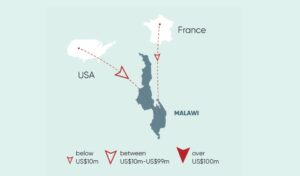A new report on the supply of surveillance technology to countries across Africa calls for Malawi to put in place robust data protection and legislation to protect the digital rights of all citizens.

The research, published by the Institute of Development Studies and the African Digital Rights Network is the first comprehensive study of the supply of surveillance technology to governments in Africa to monitor their own citizens – often in violation of constitutional, international, and domestic law – suppressing democratic debate or political challenge.
The report entitled ‘Mapping the Supply of Surveillance Technologies to Africa’ finds that governments in Nigeria, Ghana, Morocco, Malawi, and Zambia are collectively spending at least $1bn a year on digital surveillance technology contracts, with companies in the US, UK, China, EU and Israel.
Out of the five countries studied, Malawi also has the least well-developed legislative framework for data protection and privacy rights protection from unwarranted surveillance. From known contracts, the researchers identified that Malawi has spent over $27million on surveillance contracts for mobile interception and biometric ID. The Government also implemented mandatory sim card registration.
Jimmy Kainja, member of the African Digital Rights Network and author of the Malawi research, said:
“Across Africa we have found evidence that surveillance tech is being used to single out citizens for harassment, detention and torture for expressing opposing views, violating international human rights law and the technology companies’ policies.
“To prevent this happening in Malawi the Government urgently needs to introduce data protection and legal intercept legislation that protects digital rights, to ensure that all surveillance is legal, necessary, and proportionate.
“It also needs to be transparent about all government surveillance technology contracts and information about them in the public domain.”
The report is published at a time of increasing unease about the checks and balances for the use of AI, and the potential for misuse by increasingly authoritarian governments. Based on the research findings, the report calls for the abolition of rights-violating surveillance technologies and for the defunding of mass surveillance of citizens.
The report highlights the case of Gregory Gondwe, an investigative journalist in Malawi, who was arrested in April 2022. According to Gondwe’s account of events surrounding his arrest, the police had been tracking his phone conversations and they knew his exact location. There is no known technology that the police use to track or eavesdrop on people’s phone calls, but it could have been aided by his mobile phone as SIM registration is mandatory in the country and linked to national digital ID. The police also confiscated his mobile phone, suggesting a surveillance case. A few weeks later, the Platform for Investigative Journalism website, where Gondwe’s work is published, was hacked, an incident which is believed to be connected to Gondwe’s arrest.

